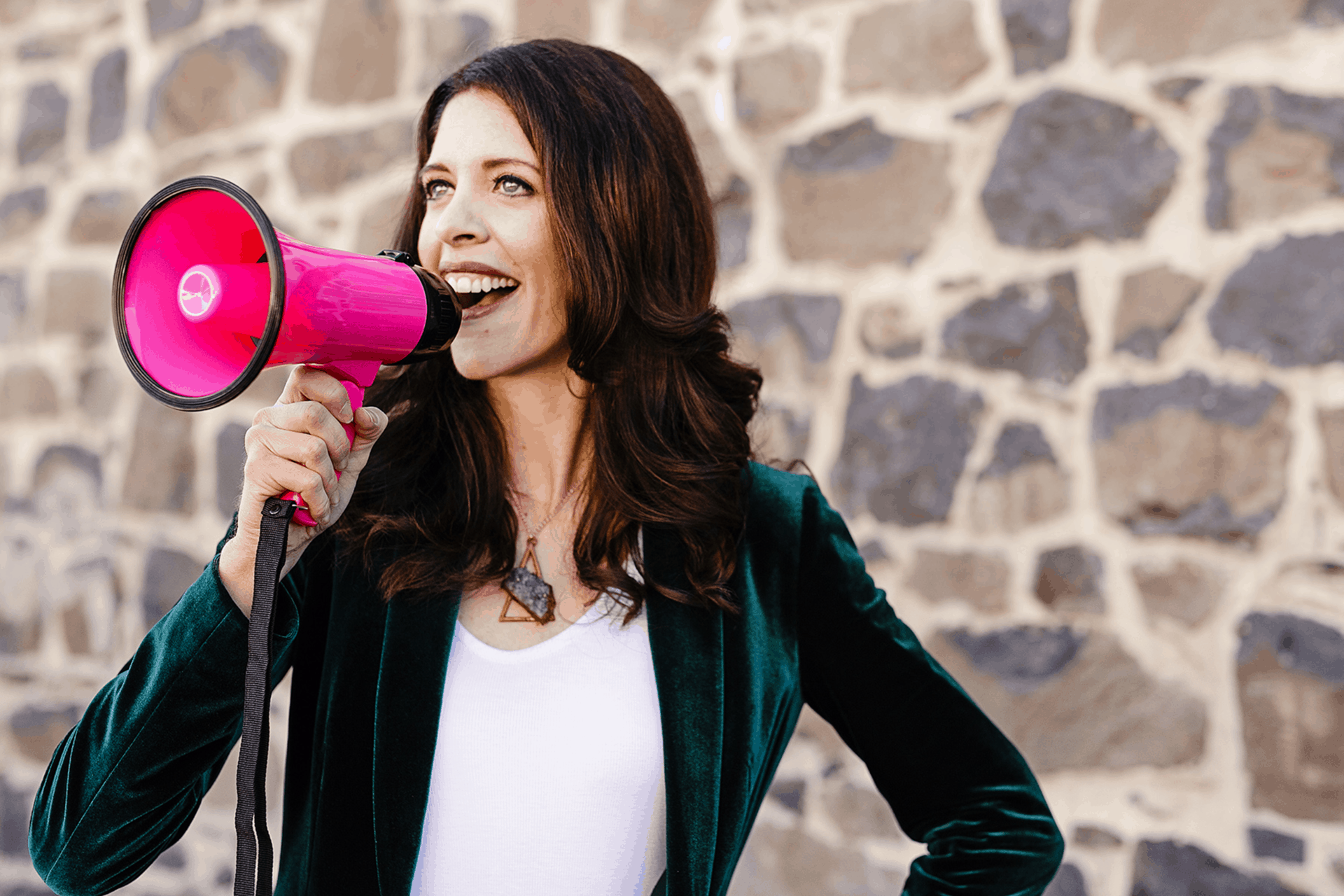
Women Need a New Paradigm for Public Speaking
In my mid-twenties, when I first decided I wanted to be a coach, one of my coaching instructors asked, “What’s the question you were born to answer?”
As everyone around me started scribbling his or her responses, I felt like a kid lost in a theme park: small, overwhelmed, and in need of some grown-up direction. Yet, as I made a habit of doing most of my life, I said nothing. I smiled, nodded my head, and I’m pretty sure even moaned a little—hmm, uh-huh, yeah—so that nobody could see how much of a phony boloney I felt like inside.
For my first few years as an entrepreneur, I was all over the place. I was constantly contorting myself into whomever I felt other people wanted me to be. As a millennial, starting out at a time when companies loved investing in training around demystifying the four generations in the workplace, I saw an opportunity; I created speaking and training content on how to onboard young professionals into the workplace. With a background working on social justice issues for nonprofits, I positioned myself as an expert on diversity and pursued work in this area. (There were at least half a dozen other topics I similarly professed to be an expert in during this time.)
I was constantly rebranding myself. I never gave the same presentation twice. And I felt like I was circling around the perimeter of my purpose, rather than speaking, coaching, and training from my zone of genius. I couldn’t shake the shame that I still didn’t know the big question I was poised to answer through my life and work.
Then, a few years into my business, I found my answer. Or rather, my answer found me.
I arrived a bit early to a social innovation conference where I was the closing keynote speaker, in time to catch the participants’ pitch fest. Each of the approximately one hundred twenty-somethings in attendance had a couple of minutes to present their big idea for how to harness entrepreneurial solutions to solve a big social, economic, or environmental problem.
And the pitches were…outstanding. Bold, well researched, and full of heart. The speakers presented their ideas in front of fellow attendees, and everyone present voted for who they felt gave the best pitch. The group was 50 percent female and 50 percent male. The average age of participants: 25.
I share these details with you so you can appreciate why, when the finalists’ names were announced, I was incredulous. Every single one of those named was male.
If, as you are reading this, you want to gasp, I get it. I did, too.
Because yes, in a room full of approximately 50 young men and 50 young women, not one woman was selected by her peers.
Whenever I’m a little riled up—and to be super-duper clear, that day I was steamier than a boiling teapot—I strive to ask questions rather than make assumptions. So I asked whoever would speak to me, “What happened? Where are the voices of our women?”
And what I learned surprised me, sobered me, and enabled me to find what had been an elusive answer to the question about my life purpose.
Both the male and female participants told me they had voted based on who they perceived to be the best speaker. In other words, who spoke up, projected confidence, took up space, owned their accomplishments, exuded charm and charisma—what we would call a more masculine model of speaking.
And yet, when I asked, “Who were the speakers that you felt most connected to? That you trusted? That made you want to really get involved in solving the issue they illuminated?” both the young men and women mentioned the names of female participants.
Why?
Well, both the male and female participants agreed that many of the female speakers shared stories that stirred the heart and the soul. They engendered trust as they told the truth about themselves, at times even confessing they still had a lot to learn before they felt their ideas could have the full impact they wanted. This, however, was not deemed effective communication.
That’s when I knew.
I felt like a bull in the ring who’d just seen a red cape, because I’d been in that audience most of my life: discounting my communication as a woman as well as my inner voice, and evaluating my success based on a masculine model that normalizes confidence, assertiveness, authority, and taking up space—qualities I always felt I had in short supply.
I want to step into my moxie, I told myself. I want to speak my passion, assert my perspectives, and be humble and honest, and I want to do it Sinatra-style: my way. I want to integrate the masculine and the feminine so that I can argue on behalf of ideas, claim space for myself and my ideas, tell stories, ask questions, make people laugh, and when appropriate, make them cry. That is what I’m born to do.
I realized this was the question I was born to answer: How can I show other people, particularly women, how to do the same with their speaking?
Less than 90 days after that life-changing and life-charging pitch fest, I re-baptized myself as a women’s speaking coach—and I haven’t looked back.











0 comments to "Women Need a New Paradigm for Public Speaking"